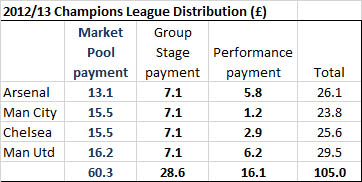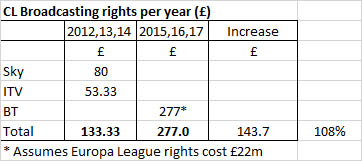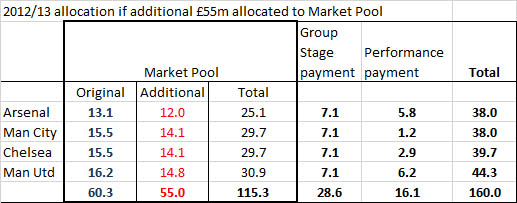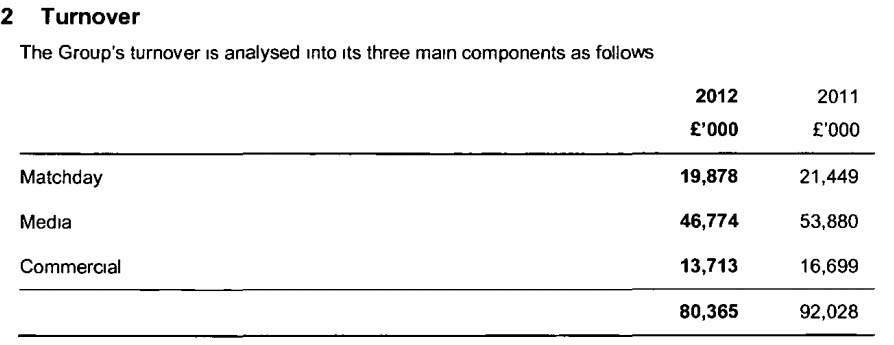BT Champions League deal makes qualification worth £40m+
BT's acquisition of the Broadcasting Rights for Champions League and Europa League football has significant implications for the English game. On the face of it, paying an increased sum for exclusive TV rights seems to be just an extension of current trends. However, when we look at the huge sums involved and calculate the financial impact on the clubs involved, it becomes clear that this deal will have far-reaching consequences.
To put this new deal in perspective, in 2011/12, UEFA received £906m in total for the TV rights for the Champions League (£735m) and Europa League (£171m). Of this, £144m (16%) came from England (£133m for CL and £11m for EL). Under the new deal, BT will pay UEFA £299m each year for both competitions.
Essentially, the process works as follows: UEFA receives income from TV rights and from Commercial sponsorship (such as Gazprom) and then redistributes most of it back to the competing clubs (keeping around 25% to distribute for football development across Europe and to pay their admin costs). A key element is the 'Market Pool', through which clubs receive a payment simply for taking part on the competition, determined by the percentage of all TV rights paid by their national TV companies. In 2012/13, whereas clubs from Russia each received around £5m as a Market Pool payment, English clubs received around £15m each. It is this Market Pool payment that will be most significantly increased as result of the new deal.

Before I show the extra cash that could be available to English CL clubs from 2015/16, we need to take out the Europa League element. Under the old Europa League deal, ITV pay around £11m for their rights. I have therefore assumed that BT managed to acquire their new exclusive rights for around twice that (£22m). Therefore, out of the £299m a year that BT will pay, I have assumed that £277m pa is for for the CL rights - this represents an increase of £143.7m pa over the old deal

The precise workings of the UEFA distribution model can change from year to year. However, there is a key constant: UEFA's most recent Financial Report (2011/12) confirms that consistently, 42.5% of UEFA's total TV rights for the CL are paid back to clubs as the Market Pool. Keeping this ratio, we can expect that out of the £143.7m uplift paid by BT each year, an additional £61.1 will be distributed back to the Market Pool. With 10% of this Pool allocated to Scottish clubs, this leaves an extra £55m for the English Champions League teams.

With 4 clubs taking part in the Champions League, this works out to an average of around £14m extra each year per club. This is a huge amount as can be seen from the total CL receipts the clubs would have received if the the deal had been in place for last season. Just getting to the Group Stage could deliver around £40m+ of income to the club.
This projection carries a significant number of caveats - however, the actual figures that the PL clubs receive are likely to be even higher - the extra BT cash and UEFA's increased commercial deals will help to push up the other elements of the distribution model. It is worth pointing out that the Europa League is a very poor substitute and will generate somewhere around £8-10m per annum per competing English club.
We need to put the figures into some kind of context to understand just how huge they are. Here are Aston Villa's turnover figures for the 2011/12 season:

Aston Villa received £33.6m from their combined Ticket Sales, Match-day income and Sponsorship for the season. This is significantly less than an English Champions League team would receive if it lost every game in the Group Stage. The uplift in income arising form the BT deal (around £14m on average) isn't far short of Villa's entire Ticket Sales and Match-day income. By way of another illustration, Liverpool's entire Match-Day income is around £42m a year.
With £40m+ available for getting into the Champions League, the stakes are raised significantly. There are currently 6 clubs that start each season with realistic expectations of securing a CL place - two will miss-out and few managers will probably survive the failure.
The clamour to secure a CL slot for the 2015/16 competition will extraordinarily intense.
The huge CL payments could well kill-off any remaining appeal of the FA Cup or League Cup for the top clubs. Why would a club fighting for a share of the £40m (and managerial survival), expend any energies on the FA Cup? Unless the distribution model changes we can fully expect to see FA Cup semi-finals with a clubs fielding weakened teams.
The figures are so huge that the difference between the 'haves' and 'have nots' may be considered simply too large for the general good of the Premier League. However CL clubs may well be resistant to sharing some of the money that they have 'earned' with their less successful peers.
There is, however, the interesting though unlikely potential of a change in the footballing order. Although it is an outside bet, if a club like Southampton or Everton were to secure a CL slot for 2015/16, they might be able to use their extra £40m to embed themselves as a CL regular. With the new spending constraint rules in place in the Premier League and UEFA's FFP rules, even historically wealthy clubs and those with a wealthy benefactor are going to find it difficult to displace an entrenched Champions League club. Any club not on the 4-seater Champions League bus in 2015/16 will seriously struggle to catch up.
For Spurs and Liverpool, the stakes are raised and many fans may feel it is a case of 'now or never'. For Manchester United, this is certainly not the time to have any post-Ferguson wobbles. Indeed, history might look back on Manchester United and conclude that his greatest failing was to retire two years too early.
blog comments powered by Disqus
